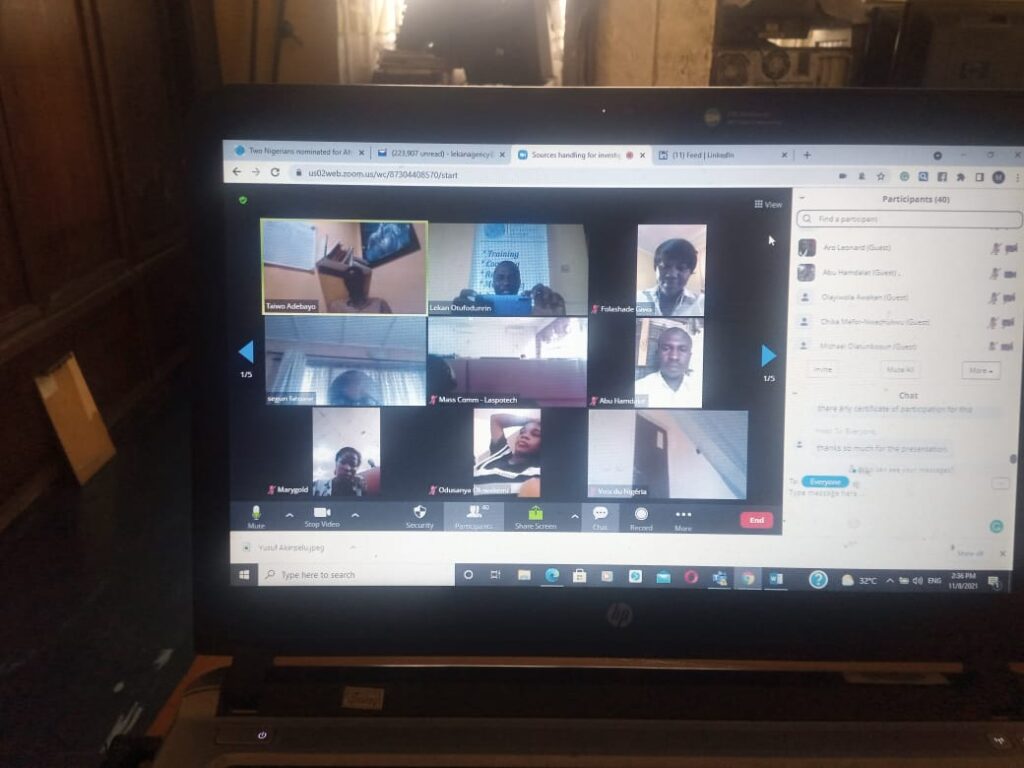Premium Times’ investigative journalist, Taiwo Adebayo has offered insights on how journalists should independently manage their sources.
He spoke at a webinar organized by the Media Career Development Network (MCDN) on Monday, November 8, 2021, which covered determining the agenda of sources, their competence and avoiding single-source reporting.
Adebayo, an Assistant Editor (Investigations) stated that journalists’ dependence on sources have to be carefully managed so that they don’t become tools in the hands of people with personal agenda.
Throughout his presentation, he cited examples in conflict situations and why journalists should make balanced, independent, and on-the-ground reporting. While stating that journalists have a task in getting to know that their sources are not lying, he said they need to “conduct an independent investigation where possible on-the-ground reporting, especially in conflict situations.”
“Whatever you want to do as an investigative journalist, sources are still central because you can’t do it without depending on what someone tells you.
“Investigative journalism as different from conventional newsgathering is essentially about digging to uncover wrong things. You can’t say you are conducting an investigation without having a revelation of wrongdoing.”
He listed where journalists can hold the powerful accountable, such as in the business sector, politics, even religious-like imams and pastors, adding that journalists can dig stories on regulatory failures, human rights abuses, extrajudicial killings, torture, social wrongdoing, human trafficking, corruption, illicit business among others.
Adebayo noted that the problem with some journalists is that they don’t know how to handle their sources and they don’t go beyond the surface.
“For example, if you cover the statehouse or presidential villa, the spokesperson to the president or a senator could come and give you some details and you just report it that way. For us who do investigative journalism, we do more than that, we go behind to check why, and how, is this thing true? And that’s how to hold people to account.”
He stated that journalists do this for public interest while citing the Pandora Papers investigation he was part of that uncovered wrongdoings in various institutions which he stated is about public interest because the public holders are guided by public laws.
“If you need to go beyond the surface, you will need people with real information, with wider information. Information not already in the public domain.”
To effectively handle sources, Adebayo stated that power relations between the media and informants need to be managed.
” You need “to negotiate. Most times, sources usually bother journalists about when the story will be out.
“Apart from what the sources said, it is pertinent to ask professionals or experts in the field so as to know if the ramification is wider.”
Adebayo noted that it is very common for journalists to be given a scoop, but the task is on journalists to find out if the person has a vested interest or having exaggerated figures about a casualty.
“If someone calls you that they got some documents about a wrongdoing someone is doing or an institution is doing, how do you do that? Is very common for journalists to be called by someone. But how do we handle this? How do you know that such a person is of infested interest?
“If you are reporting extrajudicial killings for instance, how do you know that people you are talking to are not people with interest, with exaggerated figures? And if you are not careful, you will mislead the public. Then how do we avoid all these things?”
Adebayo also emphasized the need to avoid single-source reporting.
“You have to avoid single-source reporting and conduct an independent investigation. A single source is someone coming to you to tell you something and that then forms the basis of your publication. So you have to avoid that. The reason fundamentally is that how something appears is not always reality; you don’t have to rush. This is because the information someone has could not always be true.”
“If you are dealing with single-source reporting, you may end up publishing half-truth, fake news, you may end up not exploring the ramifications as much as possible.”
He advised journalists to make on-the-ground investigations by going to places, seeing victims, and speaking with community leaders.
“You have to examine how sources would possibly know what they are claiming especially if it is oral testimony without documents or multimedia materials.”
Adebayo tasked journalists to always hear from those being investigated and make use of new media tools like Google scholar to further explore their reporting.
He also stated that extensive reporting prevents unnecessary lawsuits and empowers the public, hence journalists should always look at possible ways of getting evidence.
Adebayo urged journalists to be fair to their readers as they are protecting their sources, too.
One of the participants, Adejumo Kabir of HumAngle asked how to get real evidence from people who claim to be eyewitnesses in conflict situations but do not have pictures or clues of the perpetrators. Adebayo answered while citing different examples that the description by the sources could be of help but that shouldn’t make the basis of the story.
Another attendee, Hammed Sulaiman asked how freelancers can conduct big investigations without official Identity cards, Adebayo answered that most freelancers are sometimes given documents or means of identity in some cases with whom they are working for.
Responding to how journalists who work with privately-owned media houses can do investigative reports on allegations against someone linked to the ownership of such media houses. Adebayo answered that it is tricky but some media houses are ready to take such stories up.
Executive Director of MCDN, Lekan Otufodurin buttressed what Adebayo discussed and urged attendees to always attend training for their professional development.

